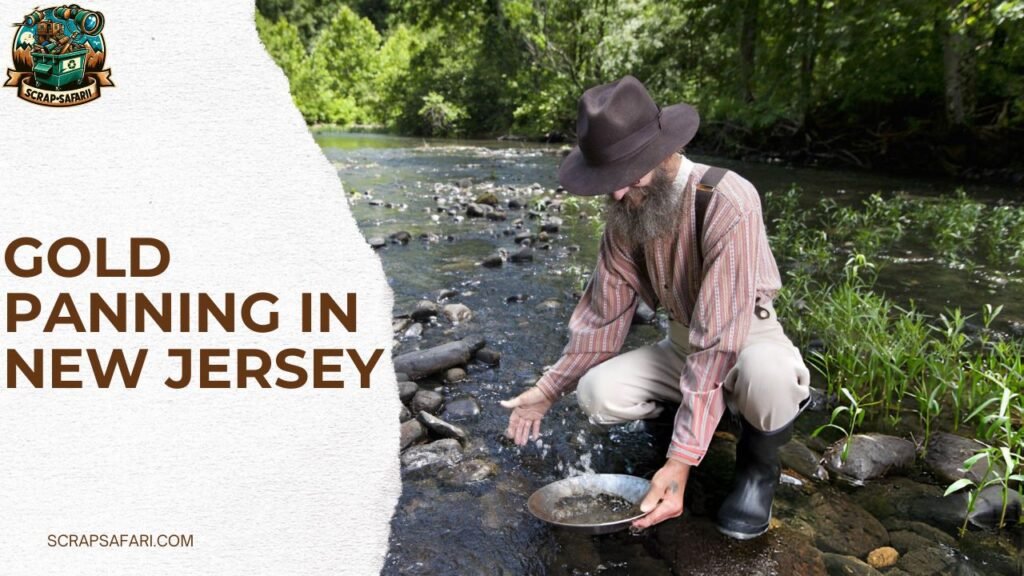Gold panning is an exciting and rewarding outdoor activity that has captivated the imagination of adventurers for centuries. The allure of striking it rich by uncovering precious metal nuggets or flakes hidden in streams and rivers is an irresistible draw for many. While the chances of making a fortune are slim, the thrill of the hunt and the connection with nature make gold panning a beloved pursuit for hobbyists and prospectors alike.
In New Jersey, the prospect of discovering gold may seem unlikely, but the state’s geological history has left behind tantalizing traces of this precious metal. The northern regions of the state, in particular, hold promise for those willing to explore and pan with patience and skill. From the glacial deposits of the Pequest River to the mineral-rich veins around the Sterling Hill Mine, gold panning in New Jersey offers a surprising array of opportunities for adventurous souls.
The art of gold panning requires a combination of knowledge, technique, and perseverance. It’s a pursuit that demands an appreciation for the great outdoors, a willingness to get your hands dirty, and a keen eye for spotting the telltale glimmers of gold amidst the gravel and sand. Whether you’re a seasoned prospector or a curious newcomer, the thrill of discovering even the smallest fleck of gold is a reward in itself.
Glacial Deposits
The gold you find in New Jersey has a fascinating origin story. It’s not native to the state, but rather, it’s a gift from the glaciers of the last Ice Age. These massive ice sheets, originating from the north, carried with them gold-bearing materials from the Abitibi Gold Belt in Canada. As they receded, they left behind glacial deposits scattered across New Jersey. So, when you’re panning for gold in the Garden State, you’re actually sifting through remnants of ancient Canadian geology!
Types of Gold Deposits
In your gold panning adventures, you’ll come across two main types of gold deposits: placer gold and lode gold. Placer gold is the type you’re most likely to encounter in New Jersey’s rivers and streams. It’s been washed down from the original Canadian deposits by the glaciers and deposited in the state’s waterways. Lode gold, on the other hand, is gold that’s still in the rock where it was originally deposited. While placer gold is more commonly found by amateur prospectors, there are also opportunities to find lode gold, especially if you’re willing to put in the effort to extract it from the rock.
Laws and Regulations For Gold Panning in New Jersey
Gold panning is a popular recreational activity in New Jersey, but it’s important to understand the legal considerations before embarking on your prospecting adventure. Failing to comply with regulations can result in hefty fines or legal consequences.
In New Jersey, you need to obtain a permit from the state’s Department of Environmental Protection (NJDEP) for any gold panning activities on public lands. The permit is relatively inexpensive and can be obtained online or through the local NJDEP office. It’s essential to have this permit on hand while prospecting, as enforcement officers may ask to see it.
Additionally, you’ll need to secure permission from landowners if you plan to pan for gold on private property. Trespassing on private lands without authorization is illegal and can lead to serious consequences.
When it comes to public lands, there are specific regulations regarding where you can and cannot prospect. Generally, gold panning is allowed in most state parks, forests, and wildlife management areas, but there may be designated areas that are off-limits. It’s crucial to check with the local authorities or park rangers to ensure you’re not violating any rules or regulations.
It’s also important to note that certain areas may be designated as protected or environmentally sensitive, and gold panning activities may be restricted or prohibited in these locations. Always respect these regulations and avoid prospecting in areas where it could cause harm to the natural environment or disrupt sensitive habitats.
Remember, gold panning is a recreational activity, and the preservation of New Jersey’s natural resources should be a top priority. By following the laws and regulations, you can enjoy this exciting hobby while ensuring that future generations can continue to appreciate the state’s natural beauty and resources.
Top Spots For Gold Panning in New Jersey
Pequest River
The Pequest River, located in Warren County, is widely regarded as one of the best spots for gold panning in New Jersey. This scenic river winds through the picturesque countryside, offering ample opportunities for prospectors to try their luck. The river’s gravel bars and bends are known to harbor small flakes and nuggets of gold, making it an exciting destination for both novice and experienced panners.
Northern Gold Creeks In New Jerswy
While the Pequest River is a hot spot, several other rivers and gold creeks in new jerswy also hold promise for gold panning enthusiasts. The Musconetcong River, Paulins Kill, and Flat Brook are all worth exploring, as they flow through areas with a rich mining history and potential for gold deposits. These waterways often contain gravel bars and bends where gold can accumulate, making them prime locations for patient and persistent prospectors.
Sterling Hill Mine Area
The Sterling Hill Mine area, located in Ogdensburg, is a unique and historically significant location for gold panning in New Jersey. This former zinc mine is renowned for its diverse mineral deposits, including traces of gold. While the mine itself is no longer operational, the surrounding area offers ample opportunities for prospecting in gold creeks in new jerswy. The presence of mineral-rich tailings and abandoned mine workings adds an extra layer of intrigue for those seeking to uncover hidden treasures.
Maps and Directions
To help guide prospectors to these prime locations, detailed maps and directions will be provided. These resources will include GPS coordinates, access points, and any necessary permissions or permits required for specific areas. By providing clear and accurate navigation information, gold panners can maximize their time on the ground and increase their chances of striking gold.
Specific Locations
While popular locations like the Hudson River offer great opportunities for gold panning, there are also lesser-known gold creeks in new jerswy and rivers where gold has been found. For instance, the Raritan River and its tributaries have been known to contain traces of gold. Additionally, historic sites can be a gold panner’s paradise. The site of the old Marlboro Mine, for example, is known for containing traces of gold. Exploring these lesser-known locations can add an element of adventure to your gold panning experience and potentially lead you to untapped gold deposits.
Essential Gold Panning Equipment
To embark on your gold panning adventure in New Jersey, you’ll need to have the right equipment. Here’s a list of essential items that every prospector should have:
Basic Equipment
- Gold Pan: This is the most crucial piece of equipment for gold panning. A good-quality gold pan is designed with riffles and a flat bottom to help separate the heavy gold particles from lighter materials like sand and gravel. Look for pans made of durable materials like plastic or metal.
- Classifier: A classifier is a specialized sieve used to separate larger rocks and debris from the smaller, gold-bearing materials. It helps you concentrate your efforts on the most promising material.
- Shovel: A sturdy shovel is necessary for digging and scooping material from the riverbed or creek. Look for a short-handled shovel with a wide scoop for maximum efficiency.
- Snuffer Bottle: This small bottle is used to collect and store any gold flakes or nuggets you find during your panning session. It’s essential to have a snuffer bottle to prevent losing your precious finds.
Optional Advanced Equipment
While the basic equipment is sufficient for most gold panning activities, experienced prospectors may want to consider investing in some advanced tools:
- Sluice Box: A sluice box is a more advanced tool that allows you to process larger quantities of material more efficiently than a gold pan. It’s particularly useful for areas with higher concentrations of gold.
- Portable Dredge: For those who want to explore deeper waters, a portable dredge can be a valuable addition to your prospecting arsenal. These devices allow you to vacuum up material from the bottom of rivers or streams.
- Metal Detector: While not strictly necessary for gold panning, a metal detector can help you locate potential gold-bearing areas more easily, especially in areas with a high concentration of nuggets.
Where to Buy or Rent Equipment
Most prospecting equipment can be purchased from specialized outdoor or mining supply stores, both locally and online. However, if you’re just starting out or want to try gold panning before investing in your own equipment, consider renting gear from local prospecting clubs or outfitters.
With the right equipment in hand, you’ll be well-prepared to embark on your gold panning journey in New Jersey. Remember, patience and persistence are key to successful prospecting, so don’t get discouraged if you don’t strike it rich on your first outing.
Tips for Successful Gold Panning in New Jersey
When it comes to successful gold prospecting in New Jersey, timing and technique are crucial factors. The best times of year for gold panning in the state are typically during the spring and fall seasons. Spring runoff can expose new gold deposits, while fall brings lower water levels, making it easier to access riverbands and creeks.
One of the most effective techniques for finding gold is to look for black sand and gravel deposits. These deposits often contain heavy minerals, including gold, which can settle at the bottom of streams and rivers due to their density. When you come across a promising area, take the time to carefully pan and sift through the material, as even small flakes or nuggets can be easily overlooked.
To test for the presence of gold, you can use a variety of methods. One simple technique is to use a snuffer bottle, which allows you to collect and inspect any heavy particles or specks that may be gold. You can also use a magnet to separate out any magnetic black sand, leaving behind the heavier, non-magnetic gold particles.
Safety should always be a top priority when gold panning in New Jersey. Be aware of your surroundings and avoid areas with strong currents or unstable banks. Wear appropriate footwear and clothing, and consider bringing a buddy along for added safety. It’s also important to respect private property boundaries and obtain necessary permits or permissions before prospecting on public lands.
Environmental considerations are also crucial for responsible gold panning. Avoid disturbing sensitive habitats or damaging vegetation, and be mindful of any potential impact on local wildlife. Follow the principles of “leave no trace” and make sure to properly dispose of any waste or debris. By practicing responsible gold panning techniques, you can enjoy this exciting hobby while minimizing your impact on the natural environment.
Panning Technique
Mastering the right panning technique can significantly increase your chances of striking gold. Gold is heavier than most other minerals, so it tends to settle in areas where the water slows down. These include the inside bends of rivers and creeks, behind large boulders, and where streams level out. By focusing your efforts on these areas, you’re more likely to find gold. Remember, the key to successful gold panning is patience and attention to detail. Take your time to carefully sift through the sediment and keep your eyes peeled for that elusive glint of gold.
Sampling Multiple Locations
Gold deposits in New Jersey can be sparse and isolated, so don’t limit yourself to just one location. Sampling multiple locations not only increases your chances of finding gold but also adds variety to your gold panning experience. If you don’t find gold in the first few places you try, don’t get discouraged. Keep moving and testing different spots. Remember, every seasoned prospector knows that patience and persistence are key in gold panning.
Public vs. Private Gold Panning Areas in New Jersey
In New Jersey, gold panning opportunities exist on both public and private lands, each with its own set of regulations and considerations. Understanding the differences between these areas is crucial for a successful and legal gold panning experience.
Public lands, such as state parks, national forests, and designated recreational areas, are generally open to gold panning activities. However, it’s essential to check for any specific rules or restrictions that may apply to the area you plan to visit. Some public lands may require permits or have designated areas for gold panning to protect the environment and ensure public safety.
On the other hand, private lands are owned by individuals or companies, and accessing them for gold panning requires obtaining permission from the landowner. This can be a more challenging process, but it can also open up opportunities to explore areas that may be richer in gold deposits.
To gain access to private lands, it’s recommended to research the ownership of the property you’re interested in and reach out to the landowner directly. Explain your intentions and provide assurances that you will respect the property and follow any guidelines they may have. Building a positive relationship with the landowner and demonstrating your responsible approach can increase your chances of gaining access.
Regardless of whether you’re panning on public or private lands, it’s crucial to respect property rights and follow environmental guidelines. Avoid damaging the land or disturbing natural habitats, and always leave the area as you found it. Additionally, be mindful of any cultural or historical sites and refrain from disturbing them.
When panning on private lands, it’s essential to follow the landowner’s instructions and guidelines to the letter. Respect any areas they deem off-limits and adhere to their rules regarding access, parking, and cleanup. Maintaining a positive relationship with the landowner can ensure continued access to the property in the future.
By understanding the differences between public and private gold panning areas and following the appropriate guidelines, you can enjoy a rewarding and responsible gold panning experience in New Jersey.
FAQs About Gold Panning in New Jersey
Do I need a permit to go gold panning in New Jersey?
In most cases, you will need a permit or written permission to go gold panning in New Jersey, especially on public lands. The regulations vary depending on the location, so it’s crucial to check with the appropriate authorities before prospecting.
What is the best time of year for gold panning in New Jersey?
The prime season for gold panning in New Jersey is typically from late spring to early fall when water levels are lower, and the weather is mild. However, some dedicated prospectors brave the colder months, as long as the waterways are not frozen over.
How do I identify a good spot for gold panning?
Look for areas with black sand or gravel deposits, as these are often indicators of gold presence. Additionally, bends in rivers and streams, where the current slows down, can be prime spots for gold to accumulate.
What should I do if I find a large gold nugget?
If you happen to strike it rich and find a significant gold nugget, it’s essential to report your find to the appropriate authorities, as there may be legal requirements or claims to consider, especially on public lands.
Is it legal to use sluice boxes or other equipment in New Jersey?
The use of sluice boxes, dredges, or other mechanized equipment for gold prospecting is generally not allowed on most public lands in New Jersey. It’s best to stick to traditional hand panning methods unless you have explicit permission from the landowner or relevant authorities.
What should I do if I encounter problems with private landowners or other prospectors?
If you encounter any issues or conflicts with private landowners or other prospectors, it’s crucial to remain calm and respectful. Politely explain your situation and try to resolve the issue amicably. If necessary, you may need to leave the area and seek guidance from local authorities.
How can I increase my chances of finding gold?
Persistence and patience are key when it comes to gold panning. Additionally, thoroughly researching the area, using the right techniques, and investing in high-quality equipment can increase your chances of success. Don’t be discouraged if you don’t strike gold immediately – keep trying and learning from experienced prospectors.
Final Thoughts and Encouragement
Gold panning in New Jersey is an exciting and rewarding hobby that offers a unique connection to the state’s rich natural history and geological treasures. While it may seem daunting at first, with the right knowledge, equipment, and mindset, anyone can embark on this thrilling adventure.
As you’ve learned throughout this guide, New Jersey boasts numerous prime locations for gold prospecting, from the renowned Pequest River to the mineral-rich Sterling Hill Mine area. By familiarizing yourself with the legal regulations, obtaining the necessary permits, and investing in the essential equipment, you’ll be well-prepared to start your gold panning journey.
Remember, success in gold panning lies not only in the right techniques but also in patience, perseverance, and a deep appreciation for the great outdoors. Don’t be discouraged if you don’t strike gold immediately; the true joy lies in the experience itself, the camaraderie with fellow prospectors, and the connection with nature.
As you venture out into New Jersey’s streams and rivers, take the time to marvel at the beauty that surrounds you, and cherish the moments of tranquility and discovery. Gold panning is not just a hobby; it’s a way of life that fosters a deeper understanding and respect for the natural world.
We encourage you to take the leap and start your gold panning adventure in New Jersey. Share your experiences, tips, and findings with the community, and inspire others to explore this fascinating pursuit. Together, we can uncover the hidden treasures that lie within our state’s waters and create lasting memories that will be cherished for years to come.
Gold panning in New Jersey offers more than just the thrill of finding your own treasure. It’s a hands-on lesson in geology and history, and a chance to connect with the state’s beautiful natural landscapes. Whether you’re a seasoned prospector or a curious beginner, there’s potential for you to uncover something valuable. So why not grab a pan and start your own gold panning adventure? Who knows, the next glacial deposit you sift through might just hold your golden ticket!

Eli Bryngelson is an expert on gold panning in the United States. As an author for Scrapsafari.com, he shares his knowledge and insights on this popular outdoor activity. Eli has extensive experience in gold panning and is passionate about helping others discover the excitement and rewarding nature of this hobby.
Through Scrapsafari.com, Eli provides detailed guides, tips, and advice for both novice and experienced gold panners. His articles cover a range of topics, including the best locations for gold panning, essential equipment and techniques, safety considerations, and the history and culture surrounding this time-honored tradition.
Readers can connect with Eli through his active social media presence on platforms like Instagram (@bryngelsoneli_) and Facebook (/ebryngelson1), where he shares photos, stories, and insights from his gold panning adventures. With Eli’s expertise and enthusiasm, Scrapsafari.com visitors can embark on their own prospecting journeys and uncover the hidden treasures that lie within the nation’s rivers and streams.


